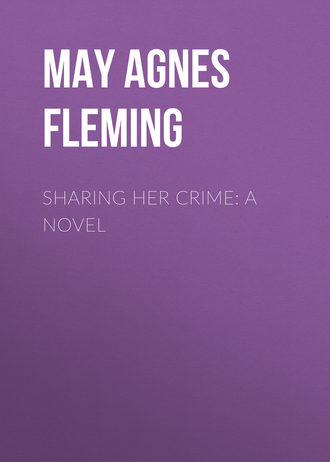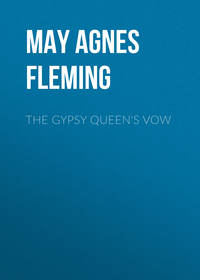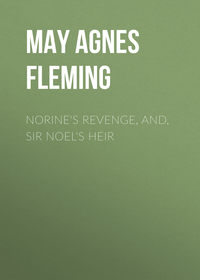 полная версия
полная версияSharing Her Crime: A Novel
They reached Valley Cottage all too soon. Louis handed her out, and entered the cottage after her.
Miss Hagar sat in her old seat, as though she had never moved from it.
"Good-morning, dear Miss Hagar," said Celeste, kissing her so affectionately that Louis inwardly wished he could become an old woman forthwith. "See – I have brought a stranger home with me."
Louis stood smiling before her. She raised her solemn, prophetic gray eyes to his face, with a long, earnest gaze.
"Louis Oranmore!" she exclaimed – "welcome home!"
He raised the withered hand she extended so respectfully to his lips that a radiant glance of gratitude from the blue eyes of Celeste rewarded him.
How that morning slipped away, Louis could never tell; but seated, talking to Miss Hagar, with his eyes fixed on the rosy fingers of Celeste flying with redoubled velocity to make up for what was lost, he "took no note of time," until the little clock on the mantel struck two.
"By Jove! so it is!" exclaimed Louis, horrified at his prolonged visit. "What will they think of me at home?"
"Stay and take dinner with us," said Miss Hagar, hospitably.
He hesitated, and glanced at Celeste.
"Pray do," she said, lifting her sunshiny face with an enchanting smile.
Inwardly rejoicing, he consented; and the long summer afternoon vanished as the morning had done – unnoticed.
"I fear your cottage is enchanted, Miss Hagar," he said, laughingly, as he at last arose to go; "I find it next to impossible to tear myself away from it. Or perhaps there is some magnet concealed that keeps people here against their will."
Miss Hagar smiled good-humoredly, and invited him to repeat his visit – an invitation, it is unnecessary to say, the young gentleman condescended to accept.
Celeste accompanied him to the door. As they passed out, he said:
"On this very spot we parted years ago. Do you remember that parting, Celeste?"
"Yes," she said, softly, while her fair face grew crimson as she remembered how wildly she had wept and clung to his neck then.
He read what was passing in her mind, and smiled slightly.
"Your farewell gift, that shining ring of gold, I have kept ever since, as a talisman against all evil," he said, with a slight twinge of conscience as he remembered where it was – at the bottom of one of his trunks, with some scores of other tresses, severed from other fair heads, their owners long since forgotten.
"I am glad you did not forget me during your absence," said Celeste, feeling very much confused, and not knowing very well what she was expected to reply.
"Forget you, Celeste! Who could ever do so after beholding you once?" Then, seeing how painfully she was embarrassed, he turned gayly away, saying: "Good-bye, fairest Celeste! When shall we meet again?"
"I know not. Next Sunday, at church, perhaps."
"As if I could exist so long without seeing my fair Star of the Valley! May I not come to-morrow, Celeste?"
"Yes, if you will bring Gipsy."
"Oh, never mind Gipsy! She will most probably be 'over the hills and far away' long before I open my eyes on this mortal life in the morning. Therefore, to-morrow will behold me once more by the side of my liege lady."
And bowing lightly, he sprang into the saddle and galloped off, followed by Celeste's eyes until he was out of sight.
The gloaming was falling when he reached Sunset Hall. He entered the parlor. It was dark and untenanted, save by a slender, black-robed figure, seated by the window, as motionless as a statue. It was Minnette – her white hands clasped tightly together, and resting on the window-sill, her forehead leaned upon them, her long black hair falling in disorder over her shoulders.
A pang of remorse shot through his heart at the sight of that despairing figure. He went over and laid his hand gently on her arm.
"Minnette!" he said, softly.
At the sound of that loved voice, at the touch of that dear hand, she started up, and, flinging back her long hair, confronted him, with such a white, haggard face, such wild, despairing eyes, that involuntarily he started back.
"Dear Minnette, what is the matter?" he said, gently taking her hand.
She wrenched it from his grasp, with a bitter cry, and sinking back into a seat, covered her face with her hands.
"Minnette, are you ill? What is the matter?" he asked, afraid to accept the answer that his own heart gave.
"The matter!" she cried, bitterly. "Oh, you may ask! You do not know. You were not by my side from morning till night, whispering your wily words into my ear, until this fair, this angelic, Celeste came! You do not know what it is to have led a cold, loveless life, until some one came and won all the wealth of love that had all your days lain dormant, and then cast it back as a worthless gift at your feet! You do not know what it is to discover first you have a heart by its aching! Oh, no! All this is unknown to you. 'Ill!'"
She laughed wildly.
"Minnette! Minnette! do not talk so passionately! In the name of heaven, what have I done?"
"Done!" she repeated, springing fiercely to her feet. "No need to ask what you have done! Was not this heart marble – harder than marble – ay, or granite – till you came? Did you not read it as you would an open book? Did you not strike the rock with a more powerful wand than that of Moses, and did not all the flood of life and love spring forth at your command? You never said in so many words: 'I love you.' Oh, no – you took care not to commit yourself; but could I not read it in every glance of your eye. Yes, deny it if you will, you did love me, until this fair-faced seraph – this 'stray angel,' as I heard you call her – came, and then, for the first new face, I was cast aside as worthless. I was too easy a conquest for this modern hero; and for this artful little hypocrite – for her pink cheeks, her blue eyes, and yellow hair – the heart that loves you ten thousand times more than she can ever do, is trampled under foot! But I tell you to beware, Louis Oranmore; for if I am a 'tigress,' as you often called me in my childhood, I can tear and rend in pieces all those who will cause my misery."
She looked like some beautiful fiend, in her fierce outburst of stormy passion; her face livid, save two dark purple spots on either cheek; her eyes flaming, blazing; her lips, white; her wild black hair falling like a vail of darkness around her white face.
"Minnette —dear Minnette!" – like a magic spell his low-toned words fell on her maddened spirit – "you are mistaken. I never loved you as you fancy; I admired your beauty. I might have loved you, but I well knew the fierce, jealous nature that lay smoldering in your heart, under the living coals of your passions. Minnette, the woman I love must be gentle and womanly, for that means all; the fawn, not the lioness, suits me. Extremes meet, they say; and my own nature is too hot, passionate, and fiery, ever to mate with a spirit like to itself. In Celeste, gentle, tender, and dove-like – sit still, Minnette, you must hear me out." He held her down, writhing in anguish, by the force of his stronger will. "In her, I say, I find all that I would ask of a woman. Therefore my heart was drawn toward her. Had I found the same qualities in you, I would have loved you, instead of her. And now, dear Minnette, forgive me if I have occasioned you pain; but for your own peace of mind, it was necessary that I should tell you this."
She was quivering, writhing in intense anguish, crouching in her seat in a strange, distorted attitude of utter despair. His eyes were full of deep pity as he gazed upon her.
"Minnette, do you forgive me?" he said, coming over and trying to raise her head.
"Oh, leave me – leave me!" was her reply, in a voice so full of intense suffering that he started.
"Only say you forgive me."
"Never! May God never forgive me if I do!" she cried, with such appalling fierceness that he quailed before her. "Leave me, I tell you!" she cried, stamping her foot, "leave me before I go mad!"
He quitted the room: and Minnette was alone, with her own uncontrolled passions for company. The agony of ages seemed to be concentrated into those moments; every fiber of her heart seemed tearing from its place, and lay quivering and bleeding in her bosom.
Weeks passed. Day after day found Louis at Valley Cottage, reading and talking, or walking with Celeste. And she – there was no mistaking that quick flushing, that involuntary smile, that sudden brightening of the eye, at the sound of his footstep or the tones of his voice. Yes, the Star of the Valley was wooed and won. And all this time Minnette sat in her own room, alone, wrapped in her own gloomy thoughts as in a mantle – the same cold, impassible Minnette as ever. Yet there was a lurid lightning, a blazing fire, at times, in her eye, that might have startled any one had it been seen.
One bright moonlight night in July Louis and Celeste were wandering slowly along the rocky path leading to the cottage. Even in the moonlight could be seen the bright flush that overspread her fair face, as she listened, with drooping head and downcast eyes, to his low, love-toned words.
"And so you love me, my sweet Celeste, better than all the world?" he asked softly.
"Oh, yes!" was the answer, almost involuntarily breathed.
"And you will be my wife, Celeste?"
"Oh, Louis! Your grandfather will never consent."
"And if he does not, what matter?" cried Louis, impetuously. "I am my own master, and can marry whom I please."
"Louis – Louis! do not talk so. I would never marry you against his will."
"You would not?"
"No, certainly not. It would be wrong, you know."
"Wrong! How would it be wrong, Celeste? I am sure my mother would not object; and as for him, what right has he to interfere with my marriage?"
"Oh, Louis! you know he has a guardian's right – a parent's right – to interfere. Besides," she added, blushing, "we are both too young to be married. Time enough these seven years."
"Seven years!" echoed Louis, laughing; "why, that would be as bad as Jacob and – Rachel. Wasn't that the name? Come, my dear Celeste, be reasonable. I cannot wait seven years, though very likely you could. During all those long years of absence the remembrance of you has cheered my loneliest hours. I looked forward impatiently to the time when I might return and see my Star of the Valley again. And now that I have come, you tell me to wait seven years! Say, Celeste, may I not ask my grandfather – and if he consents, will you not be mine?"
"I don't know – I'll think about it," said Celeste, timidly.
"And I know how that thinking will end. Here we are at the cottage. Good-night, my little white dove! To-morrow I will see you, and tell you his decision."
One parting embrace, and he turned away. Celeste stood watching him until he was out of sight, then turned to enter the cottage. As she did so, an iron grasp was laid on her shoulder, and a hoarse, fierce voice cried:
"Stop!"
Celeste turned, and almost shrieked aloud, as she beheld Minnette standing like a galvanized corpse before her.
CHAPTER XXIX.
THE RIVALS
"All other passions have their hour of thinking,And hear the voice of reason. This aloneBreaks at the first suspicion into frenzy,And sweeps the soul in tempests." – Shakespeare.For a moment the rivals stood silently confronting each other – Celeste pale and trembling before that dark, passionate glance; Minnette white and rigid, but with scorching, burning eyes.
"Minnette, what is the matter?" said Celeste, at last finding voice. "Good heavens! you look as though you were crazed."
"Crazed!" hissed Minnette through her teeth. "You consummate little hypocrite! Your conduct, no doubt, should make me very cool and composed. Girl, I say to you, beware! Better for you you had never been born, than live to cross my path!"
Her voice was hoarse with concentrated passion – her small hands clenched until the nails sank into the quivering flesh. With a shudder, Celeste covered her face in her hands to shut out the scathing glance of those dark, gleaming eyes.
"Oh, Minnette! – dear Minnette! – do not look at me so. Your eyes kill me," she said, with a shiver.
"Would to Heaven they could!" fiercely exclaimed Minnette.
"Oh, Minnette! what have I done? If I have injured you, I am very sorry. Indeed, indeed, it was unintentional. I would sooner die than have any one hate me!" said Celeste, clasping her hands imploringly.
"Injured me!" almost shrieked Minnette, clutching her arm so fiercely, that Celeste cried out with pain. "Injured me, did you say? Yes – the greatest injury one woman can ever do another you have done me. From early childhood you have crossed my path, and, under your artfully assumed vail of simplicity, won the love of the only being under heaven I ever cared for – won him with your silly smiles, your baby face, and cowardly tears; you, a poor, nameless beggar – a dependent on the bounty of others. Hate you!– yes, from the first moment I beheld you, I hated you with an intensity you can never dream of until you feel the full weight of my vengeance; for I tell you I will be avenged; yes, I would peril my own soul, if by so doing I could wreak still more dire revenge on your head. I tell you, you began a dangerous game when you trifled with me. I am no sickly, sentimental fool, to break my heart and die – no; I shall drag down with me all who have stood in my way, and then die, if need be, gloating over the agonies I have made them suffer. Beware, I tell you; for no tigress, robbed of her young, can be fiercer than this newly awakened heart!"
She hurled Celeste from her, as she ceased, with such violence, that she reeled and fell; and, striking her head against a projecting stone, lay for some minutes stunned and motionless. A dark stream of blood flowed slowly from the wound; and Minnette stood gazing upon it with a fiendish smile on her beautiful face. Slowly, and with difficulty, Celeste arose – pressing her handkerchief to her face to stanch the flowing blood; and, lifting her soft, pitying eyes to the wild, vindictive face above her, she said:
"Minnette, I forgive you. You are crazed, and know not what you do. But, oh! Minnette, you wrong me. I never intentionally injured you – never, as heaven is my witness! I have tried to love you as a sister always. Never, never – by word, or thought, or deed – have I willingly given you a moment's pain. I would sooner cut off my right hand than offend you. Oh, Minnette! can we never be friends?"
"Friends!" repeated Minnette, with a wild laugh; "yes, when the serpent dwells with the dove; when the tiger mates with the lamb; when two jealous woman love each other – then we will be friends. Perjure yourself not before me. Though an angel from heaven were to descend to plead for you, I would neither forgive you nor believe your words."
"What have I done to make you hate me so?"
"You brazen hypocrite! do you dare to ask me what you have done? He did, too! A precious pair of innocents, both of you!" said Minnette, with her bitter, jeering laugh. "Little need to tell you what you have done. Did you not win the love of Louis Oranmore from me by your skillful machinations? He loved me before he saw you. You knew it; and yet, from the very first moment you beheld him, you set to work to make him hate me. Do not deny it, you barefaced, artful impostor! Did I not hear you both to-night? – and was not the demon within me prompting me to spring forward and stab you both to the heart? But my vengeance, though delayed, shall be none the less sure, and, when the time comes, woe to you and to him; for if I must perish, I shall not perish alone."
During this fierce, excited speech – every word of which had stabbed her to the heart – Celeste had staggered against a tree; and, covering her face with her hands, stood like one suddenly pierced by a sword; every word burned into her very brain like fire, as she stood like one fainting – dying. By a great effort, she crushed back the flood of her emotions; and when Minnette ceased, she lifted up her face – pale as death, but firm and earnest.
"Minnette Wiseman," she said, in a voice of gentle dignity, so unusual to her that the dark, passionate girl gazed on her in astonishment, "as heaven hears me, I am guilty of none of these things of which you accuse me. If Louis Oranmore loved you, I knew it not, or I would not have listened to him; if he won your heart, I dreamed not of it, or he should never have won mine. I thought you loved no one but yourself. I never – never dreamed you cared for him. For all the misery he has caused us both, may heaven forgive him, as I do! If he loved you first, you have a prior claim to his heart. I will tell him so to-morrow, and never listen to him more."
She strove to speak calmly to the end; but at the last her voice died away in a low tone of utter despair.
"Bah! your acting disgusts me!" exclaimed Minnette, contemptuously. "Do you not suppose I can see through this vail with which you would blind my eyes? You will tell him to-morrow, forsooth! Yes, you will tell him I came here to abuse you, and strike you, and load you with vile epithets, and with what saint-like patience you bore them. You will represent yourself as such an injured innocent, and I as a monster of cruelty; you will tell him, when I smote you on one cheek, how you turned the other. Faugh! do not make me despise you as well as hate you."
"You cannot despise me, Minnette; you know you cannot," said Celeste, with something like indignation in her gentle voice, as her truth-beaming eye met undauntedly the flashing orbs before her. "You know I have spoken the truth. You know in your own heart I am no hypocrite. Hate me if you will – I cannot prevent you; but you shall not despise me. I have never intentionally wronged you, and I never will. If Louis Oranmore loves you as you say, I wish you both all happiness. I shall no longer stand between you and his heart."
"Oh! wonderful heroism!" cried Minnette, in bitter mockery. "You can well afford to say you give him up, when you know he loves me no longer; when you know you have surely and unalterably won him to yourself. Well do you know this pretended self-denial of yours will elevate you a thousand times higher still in his estimation, and make him love you far more than ever before. Oh! you have learned your trade of deception well. Pity all cannot see through it as I do. Think not to deceive me as you have done so many others; I, at least, can see your shallow, selfish, cold-blooded heart."
"I will not stay to listen to your words, Minnette; they are too dreadful. Some day, perhaps, you will discover how you have wronged me. I am not deceiving you; he must give me up if what you say be true. I will even go away if you wish it – anywhere, so that you may be satisfied. I will write and tell him, and never see him more, if that will satisfy you." Her voice faltered a little, but she went on; "I will do anything – anything, Minnette, if you will only not call me such terrible things. It is fearful – horrible, to be hated so without cause."
Minnette did not speak, but glared upon her with her burning, flaming eyes. Two dark purple spots – now fading, now glowing vividly out – burned on either cheek; otherwise, no snow-wreath was ever whiter than her face. Her teeth were set hard; her hands tightly clenched; her dark brows knit, as though about to spring upon the speaker and rend her to pieces. She made one step toward her. With a piercing cry of terror, Celeste sprang away, darted through the garden gate, flew up the narrow path, burst into the cottage, closed and bolted the door, and sank, panting and almost fainting, on the ground.
"Good heavens! child, what is the matter?" asked Miss Hagar, rising, in alarm.
"Oh! save me – save me from her!" was all Celeste could utter.
"Save you from whom? Who are you speaking of? Who has frightened you so?" inquired Miss Hagar, still more astonished.
Celeste slowly rose from the ground, without speaking. Consciousness was beginning to return, but she was still stunned and bewildered.
"Merciful Father!" cried Miss Hagar, as Celeste turned toward the light, "what has happened?"
And truly she might exclaim, at beholding that deadly paleface – those wild, excited eyes – the disheveled golden hair – the blood-stained, and torn and disordered dress.
"Nothing! oh, nothing, nothing!" said Celeste, passing her hand slowly over her eyes, as if to clear away a mist, and speaking in a slow, bewildered tone.
"But, child, there is something the matter!" insisted Miss Hagar. "You look as though you were crazed, and your face is stained with blood."
"Is it? I had forgotten," said Celeste, pushing her hair vacantly off her wounded forehead. "It is nothing at all, though. I do not feel it."
"But how did it happen?"
"Oh! – why, I was frightened, and ran, and fell," said Celeste, scarcely knowing what she said.
"What was it frightened you?" pursued Miss Hagar, wondering at her strange manner.
Celeste, without reply, sank upon a seat and pressed her hands to her throbbing temples to collect her scattered thoughts. She felt sick and dizzy – unable to think and speak coherently. Her head ached with the intensity of her emotions; and her eyes felt dry and burning. Her brow was hot and feverish with such violent and unusual excitement. Her only idea was to get away – to be alone – that she might collect her wandering senses.
"Miss Hagar," she said, rising, "I cannot tell you what has happened. I must be alone to-night. To-morrow, perhaps, I will tell you all."
"Any time you please, child," said Miss Hagar, kindly. "Go to your room by all means. Good-night."
"Good-night!" said Celeste, taking her lamp and quitting the room.
She staggered as she walked. On reaching her room she set the lamp on the table, and entwined her arms above her head, which dropped heavily upon it. Unaccustomed to excitement of any kind, she felt more as if heart and brain were on fire. Loving Louis with the strong affection of her loving heart, the sudden disclosure and jealous fury of Minnette stunned and stupefied her for a time. So she lay for nearly an hour, unable to think or realize what had happened – only conscious of a dull, dreary pain at her heart. Then the mist slowly cleared away from her mental vision – the fierce words of Minnette danced in red, lurid letters before her eyes. She started to her feet, and paced her chamber wildly.
"Oh! why am I doomed to make others miserable?" she cried, wringing her hands. "Oh, Louis, Louis! why have you deceived me thus? What have I done that I should suffer such misery? But it is wrong to complain. I must not, will not murmur. I will not reproach him for what he has done, but try to forget him. May he be as happy with Minnette as I would have striven to render him! To-morrow I will see him, and return all the gifts cherished for his sake; to-morrow I will bid him a last adieu; to-morrow – but, oh! I cannot – I cannot!" she exclaimed, passionately. "I cannot see him and bid him go. Oh, Father of the fatherless! aid me in my anguish!"
She fell on her knees by the bedside, and a wild, earnest prayer broke from her tortured lips.
By degrees she grew calm; her wild excitement died away; the scorching heat left her brain, and blessed tears came to her aid. Long and bitterly she wept; long and earnestly she prayed – no longer as one without hope, but trustful and resigned, bending her meek head to the blow of the chastening rod.
She arose from her knees, pale, but calm and resigned.
"I will not see him," she murmured. "Better for us both I should never see him again! I will write – I will tell him all – and then all that is past must be forgotten. In the creature I was forgetting the Creator; for the worship of God I was substituting the worship of man; and my Heavenly Father, tempering justice with mercy, has lifted me from the gulf into which I was falling, and set me in the narrow way once more. Henceforth, no earthly idol shall fill my heart; to Him alone shall it be consecrated; and I will live on in the hope that there is yet 'balm in Gilead' for me."
It was very easy to speak thus, in the sudden reaction from despair to joy – very easy to talk in this way in the excitement of the moment, after her heart had been relieved by tears. She thought not of the weary days and nights in the future, that would seem to have no end, when her very soul would cry out in wild despair for that "earthly idol" again.






